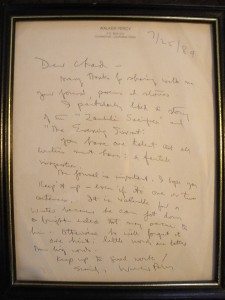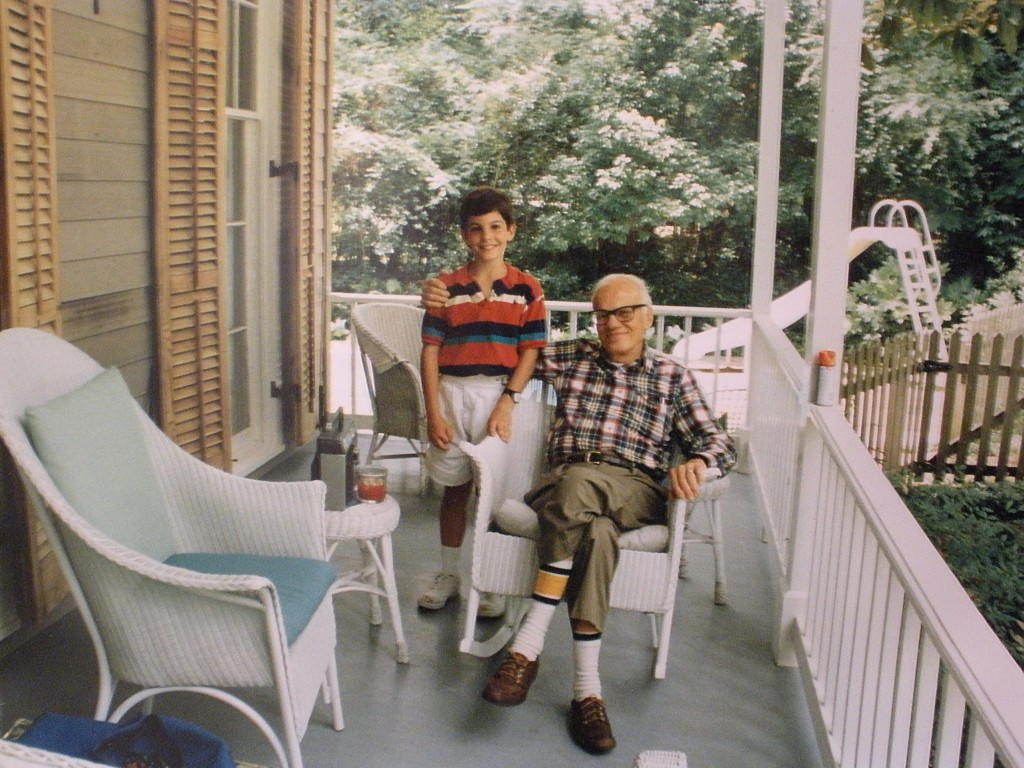As a boy of eleven, when I asked Bunt, the perennially charming wife of Walker Percy, if I could meet the great writer, little did I know I would soon feel such inspiration, and years later, such admiration for the man’s character. Percy taught me two lessons valuable to any artist, lessons I want to share.
One humid afternoon in late July 1989, my parents dropped me off at Percy’s Acadian-style home in Covington, Louisiana, just north of New Orleans. I had seen the very reserved figure many times, as Bunt drove him to and from the tennis lessons of his grandsons, David and Jack. Sitting in the wicker chairs on Dr. Percy’s front porch, looking out at a pond, the towering pines, and sprawling live oaks, we spoke of writing. He read my yellow notebook of poems and my marbled-black-and-white Mead notebook containing several chapters of a mystery novel. I asked him many questions about writing. I regret telling him so many of my own thoughts, rather than listening more to that very rare, very special literary lion.
When my parents returned, Percy gave me all of his autographed works and some books of poetry by local authors. My father snapped a photo of Percy and I.
Days later, my mother surprised me with the Mead notebook, filled with Percy’s many edits in pencil (I’ve thought about donating this to his library at the University of North Carolina at Chapel Hill, but have resisted the urge, for now). She handed me an autographed magazine on Percy’s recent winning and delivery of the Jefferson Lecture, from the National Endowment of the Humanities. Inside was a handwritten letter from Percy, on his stationary, encouraging me in the writing craft.
Percy passed months later. But that visit inspired me to continue writing and to especially enjoy doing so. But Percy’s first lesson he taught me was to be brave enough to tackle the great philosophical questions and mysteries of life with fiction.
I received something greater than these gifts, many years later. After reading more about Walker Percy and his storied uncle, Senator William Alexander Percy, I knew how very fortunate I was to have spent that summer afternoon with him. And Percy’s ghost, in a sense, gifted me with the second lesson.
Percy showed me that a few hours an accomplished artist spends shepherding a young aspirant can help that fledgling artist more than anything. Percy was full aware he was dying of prostate cancer when he agreed to meet me and spend hours critiquing my writing. If time is the most precious commodity to a novelist, what about time when that novelist is dying? I fully realized this after my own father, now deceased, was diagnosed with a terminal illness.
Percy was a rare combination: a National Book Award-winning writer and existentialist philosopher, an author not afraid to involve his faith in his writing, a Southern aristocrat who stood up publicly to segregation and, decades later, other racial discrimination in the Deep South, as his uncle had famously done in the Mississippi state legislature and to callous federal officials. Percy was a beautiful soul, a great writer and philosopher who never lost his humility. He was a descendent of certain Northumbrian English nobles (immortalized by Shakespeare), yet still loved to eat burgers and people-watch in Highway 190’s Wendy’s and to drink beer and eat crawfish at Rip’s on Lake Pontchartrain with down-home people, an artist who resisted self-absorption and chose to instead responsibly lead his family. He is buried in the St. Joseph Abbey Cemetery in St. Benedict, Louisiana. My father (a long-time admirer) lies nearby, beside my very own plot. I don’t know which is the greater honor: to have Percy spend precious hours on my writing, or for me to one day rest mere yards away. But of this I am sure: Percy’s charity helped me immeasurably. It is my wish that accomplished artists strive to do the same for those who aspire, and dare, not merely in literary art, but in all of the arts.





Dallas!
So beautifully written Chad!